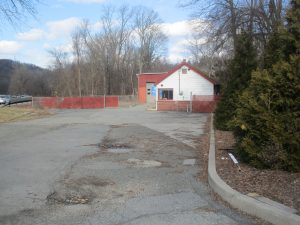Depew Street Project Defeated in Tie P’ville Planning Vote

In a stunning turn of events, Lighthouse Development’s Depew Street residential project was voted down, failing to gain the requisite support of the Pleasantville Planning Commission.
The 3-3 vote last Wednesday evening saw commission members Henry Leyva, David Keller and Anjali Sauthoff oppose the project while Chairman Russell Klein, Phil Myrick and James MacDonald voted in favor. The commission’s current vacancy left it without a seventh vote to break the deadlock.
“I think everybody was surprised at what had occurred, particularly because this was an opportunity for the village to clean up a contaminated site and increase the tax revenue on a property that hasn’t been paying taxes for many years,” said David Cooper, an attorney representing Lighthouse Development.
The contentious two-year review was unable to overcome several obstacles. Originally, the proposal called for a mixed-use project with ground-floor retail and 73 apartments but the proposed construction encroached too far into the property’s wetlands buffer.
Concessions made by Lighthouse developer David Mann eliminated the commercial component, so that the proposal ultimately included only a 71-unit apartment building with 106 parking spaces, which would have pulled the structure nearly entirely out of the buffer.
Mann also faced having to remediate the petroleum-contaminated soil caused by the site’s former occupant, LaDuca auto repair shop, which would have cost about $1.5 million. The Brownfield Cleanup Program would have eventually reimbursed Mann for the cleanup.
Commission members who voted against the project referred to concerns voiced at the Feb. 12 public hearing. Some village residents cited traffic flow and pedestrian safety. The site is in close proximity to the Grant Street-Saw Mill Parkway intersection.
“Listening to the comments at the public hearing made me take into account my own personal observations – what I see and what I live with,” Keller said about why he voted against the proposal. “We are the boots on the ground.”
Keller disagreed with traffic experts who testified that there would be no negative impact caused by the extra traffic that would have been generated.
“Experts on both sides used the exact same models but they do not have the specificity and the uniqueness of this particular site,” he said.
Keller added that his reconsideration did not involve any further consultation with a traffic expert.
Meanwhile, Mann and one of his attorneys, David Steinmetz, were bewildered at the outcome. Steinmetz said to vote for a negative declaration under the state Environmental Quality Review Act (SEQRA), meaning there would be no significant adverse environmental impacts, only to defeat the project primarily because of traffic impacts was highly inconsistent.
“The applicant is somewhat taken aback by the vote,” Steinmetz said. “It would appear if your commission voted that there’s no significant impact associated with the development, to vote for the negative declaration, and then vote against the other components would be arbitrary. I would want them to reconsider. This board made a conscious determination after two years that there’s no sign of environmental impact.”
The commission voted 4-0 for the negative declaration last June 12, supporting the soil remediation and the project’s stormwater treatment that would “result in better water quality leaving the site.” Sauthoff and Myrick were absent for that vote.
Sauthoff said she was also unconvinced about Mann’s claim of “extraordinary hardship,” referring to the soil remediation work. Mann had claimed the work would cause financial hardship despite the Brownfield Cleanup Program reimbursement.
Cooper pointed out that experts representing both sides stated that the project would have no negative impacts.
“If the voters who have adopted the negative declaration are now denying the applicant based on comments about traffic from the public hearing, I want the record to reflect that since it will be reviewed by others,” Cooper said.
He gave no indication whether his client would appeal the decision to the village or head to state Supreme Court to file an Article 78.
Leyva, though, said he had concerns about the project from the start.
“It’s just a bunch of little things that don’t sit right with me,” he said. “I was moved by comments made during the public hearing and the concerns that were voiced about traffic and safety at the Saw Mill crossing and (in) the vicinity of the proposed development. Those comments deepened my concerns.”
Building Inspector Robert Hughes said the commission has since met with the village attorney in executive session, which could lead to a compromise.
“They’ve been in touch with the applicant and plan to go through some revisions,” Hughes said. “They want to avoid going to court because it is costly and takes a lot of time.”

Abby is a local journalist who has reported on breaking news for more than 20 years. She currently covers community issues in The Examiner as a full-time reporter and has written for the paper since its inception in 2007. Read more from Abby’s editor-author bio here. Read Abbys’s archived work here: https://www.theexaminernews.com/author/ab-lub2019/
